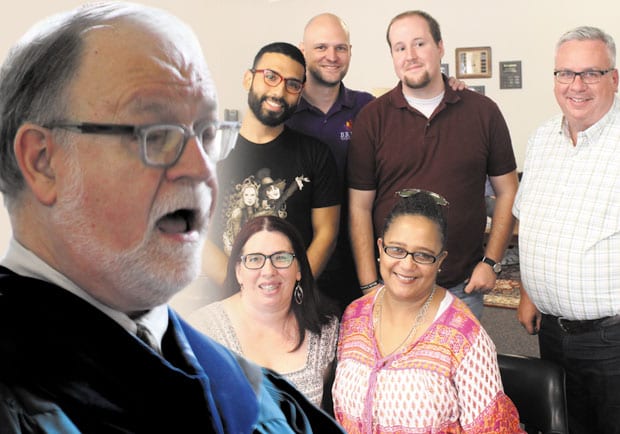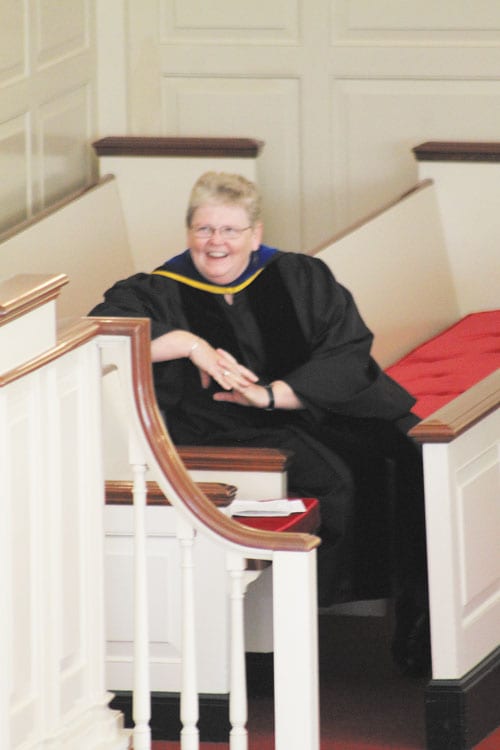Brite Divinity School tackles a subject few others touch: Ministry in the LGBT community

The Rev. Steve Sprinkle, left, and six of the students taking his class: Christian Briones, Tim Schaefer, Matt Pargeter, Jeff Spangler, Kris Cervantes and Lori Mack
DAVID TAFFET | Senior Staff Writer
The Rev. Steve Sprinkle is teaching a class entitled Ministry in the LGBT Community this semester at Brite Divinity School in Fort Worth. That alone might set Brite apart from other schools training people in ministry; more surprising is the fact that Sprinkle actually began teaching this course 17 years ago.
But what set this semester apart is how the popularity of the class has soared. Registration kept growing at such a rate that the school several times had to reassign it to ever-larger rooms.
Ironically, the class first met the same week Campus Pride released its “Shame List” of the 102 most anti-LGBT schools across the country. Nine Texas colleges made the list — and most were divinity schools around the state, including Criswell College on Gaston Avenue in Dallas.

Brite Dean Joretta Marshall
Brite Dean Joretta Marshall said this week that Sprinkle’s class is one of several on sexuality the school offers. The purpose is to train students how to be a minister in a complex world, she said. Race, class and gender issues are all connected, she noted, and all are issues Brite students will face eventually, whether they go into ministry, into academics or into the field of nonprofits.
In surveys, Marshall said, some students from mainline denominations say they can’t take these issues back to their congregations. She said some of them object to the course because they feel they need to be talking about other issues.
But this course, Marshall said, is quite practical. Its goal is to prepare ministers to provide ministry and pastoral care to LGBT people and to be leaders in discussions on LGBT issues.
The class includes both straight and LGBT students, and each student seems to have different expectations about what they want to get from the class. What they have in common is an excitement about the course. Seven of them gathered after Brite’s convocation ceremony this week to talk about it.
Christian Briones is director of student ministries at a Methodist church in Fort Worth and a Brite Masters of Divinity student. He described himself as “fit[ting] into sexual norms.” But he said he took the class because, “I want to be more exposed to how my sexuality contributes to marginalization.”
Travis Cummings, a divinity student who’s a member of Cathedral of Hope, called the class an eye-opener. It
focuses, he said, on “what they weren’t allowed to teach in high school.”
Kris Cervantes, a Unitarian Universalist minister in Waco, said she gets little support from other pastors in her city when trying to address LGBT issues. “I want to know how to be the ally who leads,” she said, explaining why she’s taking Sprinkle’s class.
Lori Mack describes herself as a “recovering criminal attorney,” now working at a Disciples of Christ Church in Fort Worth. In her previous religious experiences, she said, “I was hearing spiritually dangerous concepts.” She calls herself an ally of the LGBT community and is taking the class to learn theological reasonings to use in religious conversations on LGBT issues.
Student Tim Schaefer is following in the footsteps of his father, Frank Schaefer, the Methodist minister who was initially defrocked but finally exonerated for performing the ceremony at Tim’s marriage to another man.
“I want the church at large to see the harm done,” Tim Schaeder said. “I hope to get a strong theological case to minister.”
The students agreed that while some of the issues have changed, there will always be a need for this class.
When the class began 17 years ago, more of the focus was on ministering to people with AIDS. As new drugs were developed and HIV became a much more manageable disease, other issues arose. For some, especially the students affiliated with the Methodist church, marriage equality is still an important issue in the ongoing debate.
Mack said the Sunday after the U.S. Supreme Court handed down its landmark decision affirming marriage equality natiowide, she was horrified by the sermon she heard. Her pastor took the case to a spiritual level, she said, and she felt like she was the only person in the room who disagreed.
But for others, like Cummings, that’s a settled issue.
They agreed the marginalization and exclusion of trans people, especially as young adults, is something churches must address. Some religious groups are claiming employment discrimination against transgender people as a religious right. Some students in the class want to discuss how discrimination in employment and housing simply aren’t Christian values.
“At Brite, we should be at the forefront of social justice issues,” Cervantes said, and Briones deplored the use of the Bible as a weapon against minorities.
Matt Pargeter recalled his admissions interview, in which he and his husband both spoke with Marshall. He said she naturally included his husband in the conversation and was interested in how each of them answered. Parteger he has always known that his husband would be part of his career, wherever it leads him, but Brite has been the only school to acknowledge that and engage them as a couple.
Schaefer had a similar experience. When he was looking for seminaries, he said, there were only a handful he could even consider. He said he met and married his husband in Massachusetts, but when he settled on attending Brite, he had to bring his Texan husband back to Fort Worth kicking and screaming.
Sprinkle said when Brite was founded in 1914 and located on the Texas Christian University campus, it was chartered as a separate institution from TCU. “L. C. Brite established [it as] a separate school that wouldn’t be swayed by a liberal college,” he explained.
Brite is a Disciples of Christ seminary, but is approved by the United Methodist Church to its prepare students for ordination. Disciples of Christ voted to affirm LGBT people in all areas of church life in 2013, but doesn’t dictate policy to its congregations. Midway Hills Christian Church in Dallas belongs to the denomination, has a gay pastor — a Brite alum — and hosted P-FLAG when the Dallas chapter was founded in 1990.
The United Methodist Church has been struggling with the issue of marriage equality, but congregations like Oak Lawn UMC and Northaven UMC count quite a few LGBT people among their members.
Brite’s programs are also recognized by the Episcopal Church, the Presbyterian Church, the United Church of Christ, the Metropolitan Community Church, the Alliance of Baptists and others for training their ministers as well.
Sprinkle said when he was applying to schools at a student in the 1970s, he wouldn’t have considered Brite for himself. In 1989, however, the school hired Leo Perdue as its dean. Perdue was committed to diversity, actively recruiting a racially diverse student body and a good mix of men and women. Among his newly hired faculty was Sprinkle, an openly gay Baptist minister. Perdue hired women, blacks, a Korean-Asian and even a Jewish faculty member.
The school continued to march in its own direction when, in 2012, it hired Joretta Marshall, who is a lesbian, as executive vice president and dean. Among other LGBT staff members are Cathedral of Hope’s former senior pastor, the Rev. Jo Hudson, as an adjunct professor, and Roger Wedell, former director of Legal Hospice of Texas who has served as pastor at Midway Hills, as a program manager.
And as diverse as the school is and as well represented as the LGBT community is, Marshall said, “We don’t always know how to cross diversities.”
Explaining her vision for Sprinkle’s course, Marshall said it isn’t about sex. “It’s about giving a broader scope,” she said. “How do we live together in the world? How do I live in ministry with people I disagree with?”
Support for the class extends to Brite President Newell Williams. During his convocation speech, he referred to it and to the need for classes like this: “Irrational fears of LGBT people have resulted in violence,” he said.
Sprinkle understands the complexity of what his class is trying to accomplish. He said he hopes to give students ammunition to explain Biblical texts that have been used as weapons against the LGBT community.
He also wants students to leave with an understanding of issues facing the LGBT people that will be in their future congregations. He’d like his students to have the tools they need to help find the resources to help LGBT people they’ll minister to. And most important, he believes good clergy are leaders, and he wants to instill in them the knowledge they need to be leaders on LGBT issues.
And what would his students like from him? After talking for almost two hours about those same ideas, they had one last message for their professor.
“Tell Dr. Sprinkle to give us all A’s,” they agreed.
This article appeared in the Dallas Voice print edition September 2, 2016.
